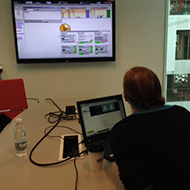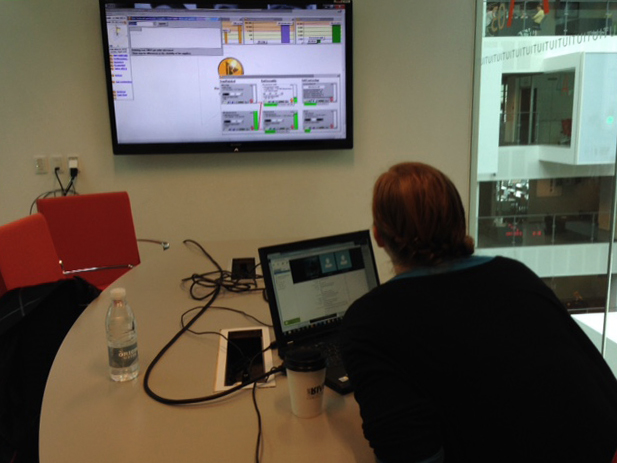VIBu is an online business simulation game, which joins students across the world in small virtual teams. The teams work in real time as they collaborate, negotiate and strategize to run their own companies manufacturing and producing goods. Decisions has to be made fast and so the communication, which relies on digital platforms, has to follow a quick pace.
ITU students attending IT-Mediated & Networked Practices course, has for the past two weeks played this game as the empirical part of the course. The course is part of the Global Relation specialization on the DIM program, but open to all ITU students. The course is organized and designed by Pernille Bjørn, Head of the Technologies in Practice research group.
Mathilde’s experience
Mathilde Brolund-Jensen (DDK) attends the course and has shared her insights on the game and what it is like working in a team of people working out of different geographical locations and across time zones.
Mathilde is studying a Master in Digital Design and Communication, and will start writing her thesis in December. She has an individual specialization, which is the reason she is attending a lot of Digital Innovation Management courses.
What is your background?
Before starting ITU, I had a Multimedia design background with lot of experience in communication and online marketing. For three years I worked for Carlsberg Group as part of their Cooperate Communications team. This means I’m used to communicating financial statements or the similar.
Why did you play the game?
I am attending the course IT-Mediated and Networked Practices, held by Pernille Bjørn and playing the game is a mandatory part of this course. Having attended the course lectures since August it is really interesting to try out the course curriculum in practice through playing the game. It gives us students the opportunity to apply theory in practice and discuss the theoretical landscape in class based on common experience.
What is the game about?
In this game, we are divided into 13 teams and in every team there is at least one student from ITU. The other team players in each team are university students from Finland, Estonia, Brazil, USA, and Indonesia.
My team is sub producers, which means we produce a part and then sell them to the other teams. We are competing with three other teams (also sub-producers) and we are striving at producing most effectively, selling the most and finally making the best profit. Most of my globally distributed team members are studying a business degree and therefore knows a lot about business management. However my role as ITU student in the team was to particular addresses the collaborative work and the use of collaborative technologies, since the key curriculum of the course is Computer Supported Cooperative Work (CSCW).
We have played the game twice and the second time we are selling our products at half the price, compared to the first time, and that is really frustrating. The first time we played we were really effective, which meant we quickly build up a profit that made us able to invest and produce more effectively than the other teams. Compared to other teams, our products were always in stock and sometimes they were forced to buy from us at any price. Partly out of luck we were the team that got the largest market share and we are still benefitting from that. But in the second game the other teams are challenging us a lot more. Another reason, we are not making as much money in the second game is that every day there is a status of how much the different teams are selling at what prices. This really made the other teams realize just how much more we where charging for our products.
How do you communicate with your teammates and the other teams?
Skype is the main means of communication, besides that we share Google drive documents and a Facebook group in my team. When we are playing the game there is an ongoing Skype conversation with my team, which makes it easy quickly getting a sale approved. In Drive we keep a register of all the sales, which makes us able to see how much the sale prices varies.
Communicating with our buyers is also done using the chat functionalities in Skype. The written form brings accountability into the negotiations, and if you agree on a prize you have it in writing.
What do you think about communicating on Skype?
It is easy to sense when people are uncomfortable with this way of communication, then they get insecure about when to speak and who are controlling the mouse. But that quickly passed in my team.
Everybody, in my team, are young university students, who are accustomed to using Skype, Facebook and Google Drive. I think this is a big part of why our communication is running smoothly. The fact that we have similar educational backgrounds means more than our cultural backgrounds.
Furthermore, we chose not to have a manager that would have to approve sales and buys. This have made the decision making much more effective. The reason this flat structure is working is because we trust each other and can tell that everybody knows what they are doing.
So for the communication to function it is important having trust within the team.
How would you feel about working in the same manner in real life?
Actually I have already experiences in working with people in other countries where the communication was IT mediated. I lived in Shanghai for seven months, still part of the Copenhagen based Carlsberg Group team. So I have tried working across border many times, but not with as big a time pressure as when playing VIBu. In the game you can constantly feel the competition breathing down your neck, but I think that is the nature of the field and not as much the setup.

